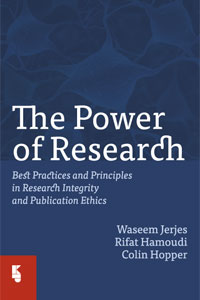Additional information
| Weight | 426 g |
|---|---|
| Dimensions | 24 × 16 cm |
| Authors | |
| ISBN | 9789062992706 |
| Publisher | |
| Publication Year | 2018 (11-4-2018) |
€29,95 excl. VAT
Also available as ebook on eBooks.com.
Get it on Google Play.
The purpose of writing this book is to clarify the proper approach to the discussion and study of research integrity and publication ethics in medical research; this will include a code of ethics for academics, as well as cover plagiarism and intellectual property rights.
At present, there is a lack of robust agreement on the degree of empirical scientific evidence for specific problems that frequently undermine integrity in research, leading to research misconduct. There is also scant knowledge about publication ethics, for which publication of a definitive code is required.
In addition, many instances of what may appear to be fabricated evidence or falsified data have arisen due to a lack of knowledge about best practice rather than intentional fraud.
A valuable resource is needed to support and define collaboration between research scholars in this field, and to recognize the boundaries and principles involved.
This book seeks to establish a firm knowledge base to address issues arising from research integrity, publication ethics, plagiarism, and protection of intellectual property. It wishes to act as an important guideline for research students for which, at present, there is a notable absence.
Key individuals who will benefit the most from this book are qualified professionals involved in the field of medical research; that is, clinical researchers, research students, and scientists. The general public, who need to place complete trust in research integrity, may also be interested in further understanding a topic that is all too infrequently discussed and rarely in the public domain.
Scientists are expected to occupy the high moral ground when it comes to the search for truth, especially in regard to the human body. Cases of misconduct tend to hit the headlines due to this very fact, which is why it is imperative that the target audience is as wide as possible to effect transparency on the subject.
The features and contents of this book will impart a greater depth of understanding about integrity and publication ethical issues to medical research scientists prior to conducting their research, and to journal editors throughout the publication process. It will explain and define the subject with clear parameters, incorporating a code of ethics.
The present book challenges the current climate of ignorance about research integrity and ethics. It will help avoid instances of misconduct, and ensuing investigations, which often arise due to ignorance. It will save time, money, and the psychological effects of accusation, reprimand, and subsequent punitive action by avoidance of wrongdoing.
If a medical researcher has been found to have fabricated the results of their studies, the book will act as a valuable guideline for proposed action; the target audience will gain from a clearer definition of research integrity.
It will obviate the tendency of some research scientists, even those highly experienced, to base their findings on personal experience, philosophical bias, political and media responses, and individual case studies.
A valuable feature of the book will be helping research scientists to advance to the next level of understanding in the study and discussion of research integrity and publication ethics.
A number of the interpretations in this book are based on special guidelines co-authored by W Jerjes and C Hopper as well as a number of au13 thors. Also, we acknowledge the support of English language specialist Sandy Eifion-Jones in improving the standard of English for the initial draft of this book.
The authors
About the authors
Preface
Part 1: Research integrity
Best research practice
Basic research misconduct terms
History
Characteristics
Focal points 1.1
Guidance on research integrity
Principles and practices in research integrity
Principles and practices in human research
Principles and practices in animal research
Focal points 1.2
Failure to declare conflicts of interests
Prevention, identification, and intervention
Focal points 1.3
Remarks
References
Part 2: Publication ethics
Best publication practice
History and characteristics
Guidance on publication ethics
Principles and practices for authors
The philosophy behind the peer-review process
Principles and practices for reviewers
Focal points 2.1
Editors and their journals
Principles and practices for the editors and editorial team
Principles and practices for publishers
|Failure to declare conflicts of interests
Focal points 2.2
Prevention, identification, and intervention
Principles and practices to breaches
Focal points 2.3
Remarks
References
Part 3: Plagiarism and protecting intellectual property
Maintaining standards
History
Defining plagiarism
Focal points 3.1
The Fair Dealing Law (UK)/ The Fair Use Doctrine (US)
The ethics of intellectual property
Blizzard of Oz: Suicide Solution
Publication and research ethics
Self-plagiarism
Plagiarism and purchasing university level manuscripts
Focal points 3.2
Potential scenarios in research integrity and publication ethics
Remarks
References
| Weight | 426 g |
|---|---|
| Dimensions | 24 × 16 cm |
| Authors | |
| ISBN | 9789062992706 |
| Publisher | |
| Publication Year | 2018 (11-4-2018) |
